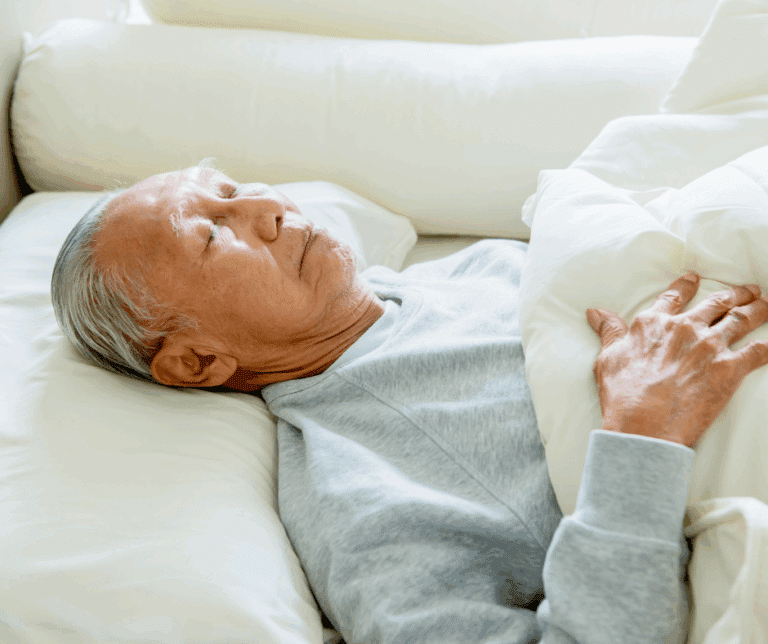Sleep deprivation does more than just leave one feeling tired—it can significantly impact physical stability and movement. When seniors don’t get adequate rest, their brains and bodies experience subtle but meaningful changes that affect how they navigate their physical world. This connection between sleep and mobility deserves more attention, especially as sleep disorders become increasingly common in seniors. Helping seniors understand this connection is one of many things senior home care assists with.
How Sleep Affects Balance and Coordination
During sleep, the brain doesn’t simply shut down—it actively processes information and restores neurological functions. Additionally, during deep sleep stages, the brain consolidates motor memories and recalibrates the vestibular system, which is essential for balance. Without sufficient sleep, these processes remain incomplete. Research has shown that even a single night of poor sleep can reduce reaction times by up to 50% and impair motor control. These deficits manifest in everyday activities: stumbling while walking, misjudging distances when reaching for objects, or experiencing difficulty with precision tasks like typing or writing.
The Neuroscience Behind Sleep-Related Mobility Issues
Sleep deprivation affects several brain regions critical for movement and stability, including the following:
- Cerebellum: The cerebellum, which coordinates movement and balance, shows reduced activity after sleep loss.
- Basal Ganglia: The basal ganglia, responsible for initiating and controlling voluntary movements, demonstrate altered neural firing patterns.
- Prefrontal Cortex: The prefrontal cortex, which handles attention and spatial awareness, experiences diminished function.
These neurological changes explain why sleep-deprived seniors show similarities to those who are intoxicated—both states impair the same brain systems governing coordination and spatial awareness.
Sleep Disorders and Long-Term Mobility
Chronic sleep issues have even more pronounced effects on mobility. Conditions like sleep apnea, which repeatedly interrupts breathing during sleep, are associated with a 2-3 times higher risk of falls in older adults. In addition, insomnia contributes to muscle weakness and reduced proprioception—the body’s ability to sense its position in space.
Perhaps most concerning is the cyclical relationship between sleep and movement problems. Poor sleep leads to balance issues, which can cause anxiety about falling. This anxiety then further disrupts sleep, creating a difficult-to-break cycle. Senior home care can help seniors break this cycle by helping them create an environment that welcomes sleep as well as teaching them relaxation techniques to help reduce anxiety.
Breaking the Cycle: Improving Sleep to Enhance Mobility
Fortunately, improving sleep quality can reverse many mobility issues. Studies show that addressing sleep disorders leads to measurable improvements in balance tests and coordination tasks within weeks. Senior home care can teach seniors simple strategies like maintaining consistent sleep schedules, creating restful sleeping environments, and limiting screen time before bed that can make a significant difference. In addition, for those with clinical sleep disorders, treatments like CPAP therapy for sleep apnea not only improve sleep quality but also reduce fall risk and enhance mobility.
The relationship between sleep and physical stability highlights an important truth: the body functions as an integrated system rather than isolated parts. By helping seniors recognize sleep as a fundamental component of physical function — not just mental health — senior home care helps seniors gain a powerful tool for improving overall mobility and reducing fall risk.
If you or an aging loved one are considering Senior Home Care in Denton, TX, please contact the caring staff at Arcy Healthcare today at (469) 293-1515
Providing In-Home Healthcare Services in North Texas, including Dallas, Hurst, Grapevine, Keller, Plano, Frisco, McKinney, Denton, Flower Mound, Carrollton, Gainesville, and more.
My name is Jimmie Stapleton. I am the founder and CEO of Arcy Healthcare. Arcy Healthcare includes Arcy Hospice, Arcy Supportive Care, Arcy Home Health and Arcy at Home.
Arcy Hospice was opened in 2007 to provide care and support for individuals and families facing a life limiting illness. It was established after my wife Ellen, who had been diagnosed with breast cancer, had completed her chemo and radiation therapies. At that time, things were looking positive, and we wanted to do something for our community that had been so supportive of our family during her treatments. Unfortunately, the cancer returned a few years later, and she subsequently passed away under our care in 2010.
In the years that followed, I began to see the need to provide the same level of excellent care to patients across the continuum of care. Therefore, we have added a home health division (Arcy Home Health), a palliative care division (Arcy Supportive Care), and a home care division, (Arcy at Home). With the addition of these divisions, we can meet most of the post-acute care needs for you and your family in your home.
I started Arcy Hospice with my wife as my motivation to provide exceptional care and support in the patient’s home, where they are surrounded by family and where they feel most comfortable. I’m proud to say that our staff provides some of the best in home care in the Dallas-Ft. Worth area.
Please let us know if we can enrich the quality of life for you or a loved one.
Sincerely,
Jimmie Stapleton – Founder and CEO
Arcy Healthcare
- Understanding the Connection Between Sleep and Balance - May 21, 2025
- Arcy Proudly Supports the TWU Meyers Stroke Center - May 19, 2025
- Making Nutrition Work for Seniors with Alzheimer’s Disease - May 8, 2025




